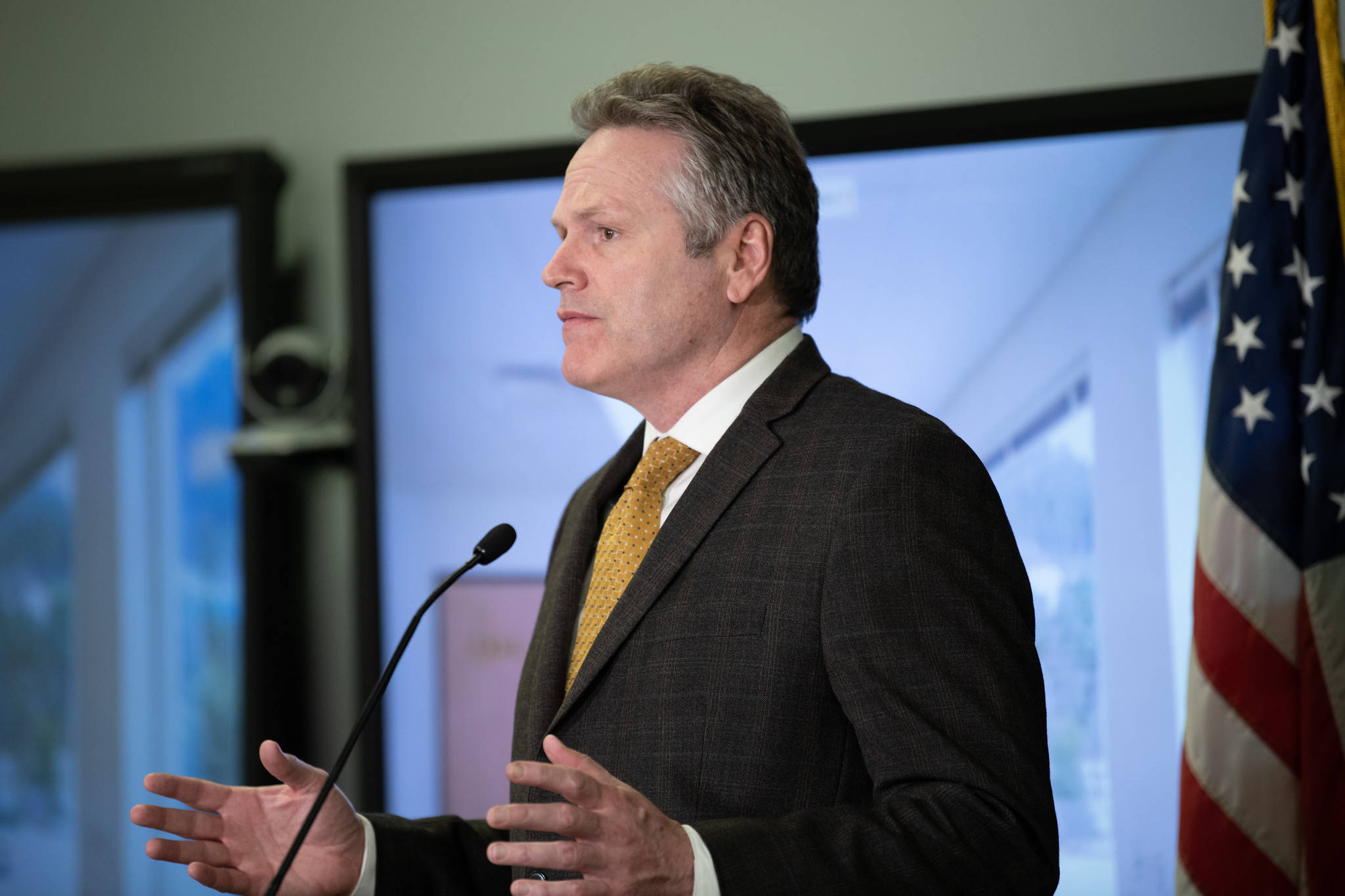Gov. Mike Dunleavy said he intends to use federal COVID-19 relief money to fill the gaps in funding left by his vetoes to the Fiscal Year 2021 budget.
Dunleavy signed the budget into law Monday, after vetoing a total of $210 million from the bill sent to him by the Legislature, according to the governor’s office. The Legislature’s budget was $314 million above the governor’s proposed budget sent to lawmakers in December.
At a Tuesday press conference, Dunleavy said he didn’t want to spend state money when funds are expected from the federal government.
“You’ll see a lot of these vetoes is (unrestricted general fund) money, a lot of that is going to be replaced with federal money,” Dunleavy said. “There’s a lot of things we can’t afford at this time, but we will be using some of that COVID money for state services.”
The “vast majority” of the vetoes would be covered by CARES Act money, according to Dunleavy, but there were some small reductions that would not be covered, he said, without citing any specific programs.
Dunleavy vetoed $31 million from state Medicaid payments, saying that federal dollars would reimburse the state. Medicaid money was cut from last year’s budget as well, but the governor’s administration was forced to add that money back in the supplemental budget.
The governor vetoed more than $400 million from last year’s budget, which he said was part of an effort to start a robust conversation about state spending. Those cuts kicked off a major political battle with the Legislature and multiple attempts to override the vetoes. Much of the funding was eventually restored.
[Federal money is coming to Alaska]
Due to federal stimulus money, less state dollars needed to be spent, said Department of Health and Social Services Commissioner Adam Crum.
“We do believe we’re going to be OK,” Crum said. “Matching federal dollars was increased by 6.2%, going forward we believe we’ll be able to maintain that level as well.”
Other items cut from the budget included money for school bond debt reimbursement and the Alaska Marine Highway System.
More than $15 million was cut from the state’s ferry system, according to a summary of the governor’s budget. Enough money was left to continue repairs and provide an additional 23 weeks of service over last year, said John MacKinnon, commissioner for the Department of Transportation and Public Facilities.
Dunleavy said he hoped the Legislature would reconsider the allocation of $1,000 for a Permanent Fund Dividend. Now more than ever, he said, Alaskans were in need of a direct infusion of cash and that a supplemental dividend should be issued in the future.
The governor also vetoed the transfer of more than $1 billion back to the main account of the Alaska Permanent Fund, potentially to use those funds for a supplementary dividend.
Some lawmakers found the governor’s reliance on federal funds irresponsible.
“There is no guarantee that the federal government will pick up the tab,” said House Speaker Bryce Edgmon, I-Dillingham, in a release. “(The governor is) using the COVID-19 crisis as justification to veto items he never supported. This approach is incredibly troubling to me.”
The Legislature can override the governor’s vetoes but that requires a three-quarters vote in each body of the Legislature. Lawmakers tried last year and at the beginning of this year’s legislative session to repeal those vetoes but couldn’t get enough members to vote for an override.
The governor said saving state funds was necessary to prepare for the economic recovery following the pandemic.
“The world has changed rapidly, many of our sectors in our economy are being slammed, we are shaving off GDP of our economy,” Dunleavy said. “As we stare at the next year and we have the opportunity this year to save some money, that’s what we did with this budget.”
Here are some spending highlights from the state budget signed by the governor:
• $99M to COVID-19 response and relief
• $135.6M to Alaska State Troopers
• $14M to Village Public Safety Officer Program
• $5M to Disaster Relief Fund
• $5M to Fire Risk Reduction Funding
• $34.8M to Pioneer Homes
• $54M to the Alaska Marine Highway System
• $1.26B to fully fund Education Foundation Formula
• $28.5M to Behavioral Health Programs
• $7.2M to Homeless Assistance Program
• $65M for Capital Federal Match Program to Highways and Aviation
Numbers provided by the governor’s office.
The governor vetoed $210 million from this year’s budget. Here are some of the sums:
• Medicaid – Veto $31,000,000
• Alaska Marine Highway System – Veto $15,548,300
• Ocean Rangers – Veto $3,426,000
• University of Alaska – Veto $12,500,000
• Pre-Kindergarten Grants – Total: $4,300,000
• Public Broadcasting – Veto $2,036,600 for Radio, $633,300 for TV
• Community Assistance – Veto $1,268,500 Designated General Fund (FY2021) and $30,000,000 Unrestricted General Fund.
• Regional Educational Attendance Area – Total: $36,739,000
• School Bond Debt Reimbursement – Total: $100,154,200
• Anchorage Response Grant – Total: $2,700,000
• One-Time Education Funding Outside of the Formula – Total: $30,000,000
• One-Time AHFC Homeless Grant – Total: $5,000,000
• Non-Mandatory Municipal Debt Reimbursement – Total: 2,354,400
Numbers provided by the governor’s office.

